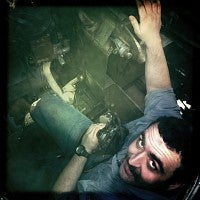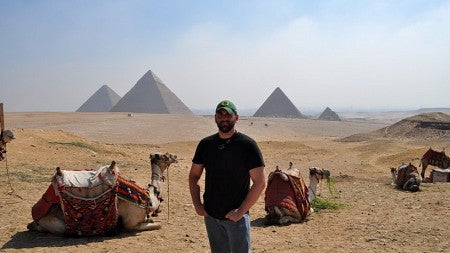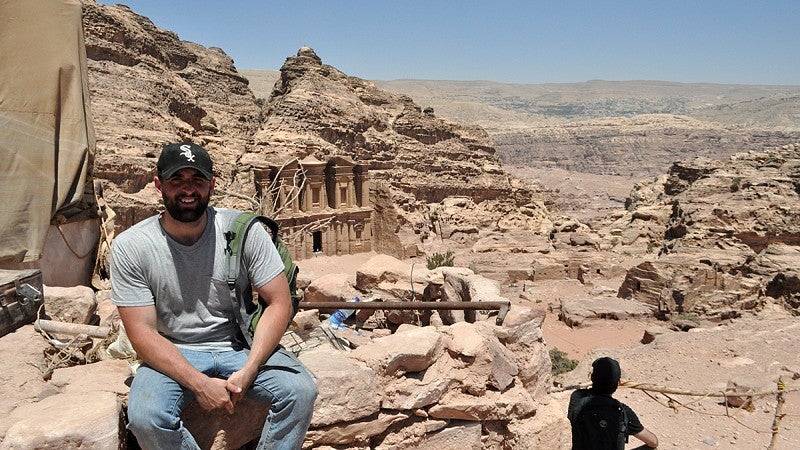Many become journalists in the hope that their career path will lead to a life of adventure. Few, however, reach the level of daring that Mat Wolf BA ’12 has.
Before Wolf even got to the University of Oregon School of Journalism and Communication (SOJC), he had already been around the world as a Marine and deployed twice to Al-Anbar Province in the Iraq War. After he left the service for the SOJC, it wasn’t long before he was back overseas, working as an intern for the Media in Ghana program.
Since graduation, Wolf has covered women’s rights in the Middle East, Syrian refugee camps in Jordan, the 2013 overthrow of Mohamed Morsi in Egypt and the ISIS conflict in Iraqi Kurdistan. He’s been on the front lines facing violent riots, mortar shells and car bombs to get the story.
Now he’s back stateside and embarking on his latest adventure: working for CNN. We caught up with Wolf to find out how his time at the SOJC helped him launch his career as a foreign correspondent.
How did your time in the Marines affect your life path?

Joining the Marines was a decision influenced by 18-year-old me thinking I would hate college. This sounds a little immature in retrospect, but I really hated high school. I had friends and was an okay student, but being stuck in a classroom all day really irked me. I thought going to college would just be four more years of high school, so I looked at other options. The Iraq war had just started, and I had friends and family members a year older who had already signed up and deployed. It sounded exciting, so I saw a recruiter the week after my 18th birthday.
Now, full disclosure: The Iraq war will rightfully be remembered as a disaster for both the local people and U.S. foreign policy. I hate politics, but I’ve become a critic of the war. Anyone who argues otherwise should just look at the state of Iraq and Syria today. In a strange way, I don’t regret the experience, though. It gave me a lot of perspective and let me see other parts of the world.
Why did you decide to become a journalist?
My interest in being a journalist goes back to high school, when I was the editor-in-chief at my high school newspaper my senior year, in 2004. And I got out of the Marines to pursue a journalism degree at the UO in 2010.
After doing some local internships at the UO, I decided I would be happier pursuing international coverage, so near graduation I came up with a plan to go back to the Middle East. This was in 2011-12, when the Arab Spring revolutions were under way, which also piqued my interest.
The SOJC was invaluable in helping me find internships and later apply for jobs. I held a Charles Snowden internship at The Mail Tribune, and I interned for The Register-Guard in 2011. Student publications like Ethos, Flux, OR Media and the Daily Emerald were also great ways to cut my teeth as a new journalist.
There are also probably too many instructors to thank. Leslie Steeves took me on with the Media in Ghana program when I was new at the UO, and that helped me expand my horizons. Dan Morrison helped me get started in the Middle East and was a great source of advice throughout my time overseas. He put me in touch with JO Magazine in Jordan, which was run by UO alumni in Amman. Rebecca Force’s blunt insight into the profession was always welcome.
What did you learn during your internships?
The Snowden internship at The Mail Tribune was my first nonstudent journalism gig, so it taught me a lot. Since we were trying to put out a daily paper in addition to being full-time students at the Emerald, it was refreshing to just focus on reporting and not attend class.
The biggest takeaway I got from Ghana is how difficult it can be to work as a local journalist there. They have a free press and journalism laws arguably more permissive than in the U.S. What they don’t have are decent salaries, which leads to a lot of semi-official bribery and influence peddling — cash for positive coverage, essentially. The practice is easy to judge as an outsider, but most journalists there wouldn’t survive without it.
One of the things I liked a lot about the Media in Ghana program is that it pairs you with Ghanaian journalists and publishers. You get to shadow professionals in the media field there and see how they operate.
What did you learn while working for Ethos and the Emerald?

Ethos was my first real writing job after starting at the UO, so it was invaluable in getting my writing skills back on track after I left the military. The Emerald taught me about the stresses of writing for a daily.
You have covered stories in a lot of dangerous situations. How do you deal with the risk factor?
I was in the middle of giant protests and rallies in Egypt in 2013. In Iraqi Kurdistan, an ISIS mortar impacted 10 meters away from me. In a separate incident in Erbil, I was really close to a car bomb going off. It shattered some of the glass in the room I was in.
It’s not that I don’t worry or get stressed, but I think I handle it differently than a lot of folks. A lot of it’s adrenaline too. When I covered the ISIS war and the 2013 military coup in Egypt, I found that not every day in those places is exciting or dangerous. There’s definitely downtime. I rented an apartment in Erbil in Kurdistan, and security-wise I could have been living anywhere in the U.S.
Tell us about your new job.
I’m writing for CNN International in Atlanta. I’ve started getting some TV scripts on air, but a lot of my first month has been training and orientation. I’m looking forward to getting to work here full time, and I think I’ll be in Atlanta for at least the next year.
It has the potential to be a big step up in my career, so I’m looking to make the most of it and see where it leads.
Story by Andra Brichacek

